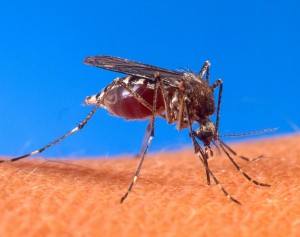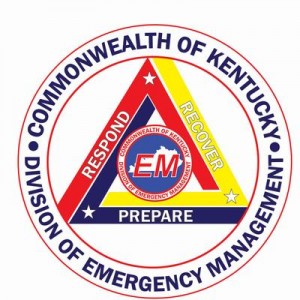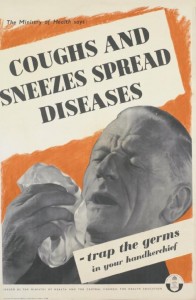Mosquitoes found in a south Louisville location have tested positive for West Nile virus.
 Mosquito samples were collected in a trap as part of surveillance by the Department of Public Health and Wellness and tested by its laboratory. The mosquitoes testing positive for West Nile were collected in the 40214 ZIP code.
Mosquito samples were collected in a trap as part of surveillance by the Department of Public Health and Wellness and tested by its laboratory. The mosquitoes testing positive for West Nile were collected in the 40214 ZIP code.
There have been no human cases of West Nile virus this year in Louisville. In 2015 there were three human cases.
But, “This is an indication that the West Nile virus is present again this year in Louisville,” said Dr. Joann Schulte, director of the Louisville Metro Department of Public Health and Wellness. “West Nile virus is most commonly transmitted to humans by mosquitoes. You can reduce your risk of being infected with West Nile virus by using insect repellent and wearing protective clothing to prevent mosquito bites.”
Fewer than 1 in 150 people infected with West Nile virus will develop serious disease. About 1 in 5 people who are infected will develop a fever with other symptoms such as headache, body aches, joint pains, vomiting, diarrhea, or rash. Most people with this type of West Nile virus disease recover completely, but fatigue and weakness can last for weeks or months. Less than 1 percent of people who are infected will develop a serious neurologic illness such as encephalitis or meningitis (inflammation of the brain or surrounding tissues).The elderly and those with compromised immune systems are at increased risk for serious disease from West Nile virus.
The Department of Public Health and Wellness advises people to take the following precautions: Continue reading
Motorists reminded to buckle up, enforcement heightened through Memorial Day
 The Kentucky Office of Highway Safety (KOHS) and the Kentucky State Police (KSP) are reminding motorists to buckle up as law enforcement agencies throughout the state join the nationwide Click It or Ticket seat belt enforcement mobilization May 23 through June 5.
The Kentucky Office of Highway Safety (KOHS) and the Kentucky State Police (KSP) are reminding motorists to buckle up as law enforcement agencies throughout the state join the nationwide Click It or Ticket seat belt enforcement mobilization May 23 through June 5.
“Every day, unbuckled motorists are losing their lives in motor vehicle crashes,” said KOHS Executive Director Bill Bell. “As we approach Memorial Day weekend and the summer vacation season, we want those traveling our roadways to do the one thing that could save them in a crash: buckle up.”
There were 761 total highway fatalities in Kentucky in 2015, with 588 killed in motor vehicles. Of those 588 fatalities, 358 (61 percent) were unrestrained. Six of those motor vehicle fatalities occurred over the Memorial Day holiday. None were wearing a seat belt.
“Clearly this is an indication that people are not taking the law seriously, or they’re just not aware of the huge risk being taken by not buckling up,” said Bell.
Kentucky has a primary seat belt law, meaning everyone is required to buckle up while in a moving vehicle.
“We will be out in force – day and night – ticketing anyone not wearing a seat belt,” said KSP Sgt. Michael Webb. “Drivers must remember that under Kentucky’s law, you are responsible for making sure all of your passengers are properly restrained.”
This year’s campaign, funded by a federal grant through the National Highway Traffic Safety Administration (NHTSA), has a special emphasis on pickup trucks. Continue reading
Farm Safety Symposium opens 2016 Dixie Fire School in Elizabethtown
Three Kentucky farmers who survived major accidents will address the 23rd annual Louis Crosier Farm Safety Symposium on Friday at 7 p.m. EST at the Elizabethtown Community and Technical College. Dale Dobson, administrator of the Kentucky Department of Agriculture’s Farm and Home Safety Program, will lead the Farm Safety Symposium and serves as president of the Dixie Fire School.
“These courageous individuals are willing to share their experiences so no one else suffers what they have suffered,” Agriculture Commissioner Ryan Quarles said. “The best way to deal with a farming accident is to prevent it from happening in the first place. That’s the purpose of KDA’s Farm and Home Safety Program – to educate people to practice safety at all times, on and off the farm.”
Gary Rock of LaRue County, Jack Trumbo of Shelby County, and Anna Ellis of Eddyville will tell how they were injured, how they endured the long and often painful road to recovery – and how their accidents could have been prevented.
The Farm Safety Symposium kicks off the 2016 Dixie Fire School, a three-day event that provides continuing education for first responders and youth on a wide variety of subjects, including rescue from grain storage facilities and large-animal emergencies. Some courses offer college credit hours.
The KDA’s Farm and Home Safety Program travels all over Kentucky to deliver farm, ATV, and lawn mower safety demonstrations. The program operates a one-of-a-kind rollover tractor simulator that demonstrates how a rollover protective structure (ROPS) and seat belt can save a tractor operator from injury or death in the event of a rollover. The program uses a miniature grain bin and gravity wagon to show the risk of becoming trapped in grain, and a power-take-off (PTO) apparatus that demonstrates the dangers of getting caught in a moving PTO, which is a rapidly rotating drive shaft used to power farm implements.
Breathitt, Fleming, Perry Counties Added
 Governor Steve Beshear announced today that residents of three additional counties with damage as a result of July severe storms and flooding are now eligible to apply for individual assistance from the Federal Emergency Management Agency.
Governor Steve Beshear announced today that residents of three additional counties with damage as a result of July severe storms and flooding are now eligible to apply for individual assistance from the Federal Emergency Management Agency.
According to FEMA, Breathitt, Fleming and Perry counties have been added to the list of counties for which individual assistance is available. Federal funding was already available to affected individuals in the counties of Carter, Johnson, Rowan and Trimble.
“This is good news for residents of Breathitt, Fleming and Perry Counties as they work to recover from these devastating storms,” Gov. Beshear said. “Our emergency management officials have worked hard to document damage and help in recovery efforts. I encourage citizens in the eligible counties to register with FEMA.”
People in the specified counties who need assistance can apply with FEMA online at: http://www.fema.gov/apply-assistance or by calling 1-800-621-3362. Assistance can include grants for temporary housing and home repairs, low-cost loans to cover uninsured property losses, and other programs to help individuals and business owners recover from the effects of the disaster.
Strong storms from July 11-20 caused heavy rain and flash flooding, which claimed lives, washed out roads and forced people from their homes in the affected communities. Four deaths have been attributed to the flash flood in the mountain community of Flat Gap in Johnson County.
Breathitt, Fleming and Perry counties were already on the list of those eligible for public assistance. In those counties, federal funding is available to local governments and certain private nonprofit organizations on a cost-sharing basis for emergency work and the repair or replacement of facilities damaged by the severe storms, tornadoes, straight-line winds, flooding, landslides, and mudslides in a total of 34 counties. The other counties are Bracken, Carroll, Carter, Clay, Cumberland, Elliott, Estill, Floyd, Henry, Jackson, Johnson, Knott, Lawrence, Lee, Leslie, Letcher, Lewis, Lincoln, Magoffin, Menifee, Montgomery, Morgan, Nicholas, Owsley, Robertson, Rockcastle, Rowan, Spencer, Trimble, Washington and Wolfe.
Federal funding is also available on a cost-sharing basis for hazard mitigation measures for the entire Commonwealth of Kentucky.
“This is a very positive outcome, Kentucky Emergency Management Director Michael Dossett said. “The incorporation of Breathitt, Perry and Fleming counties immediately makes available federal resources to impacted citizens for their long-term recovery efforts.”
Gov. Beshear issued an executive order declaring a state of emergency for all of Kentucky on July 13, 2015. The Commonwealth’s Emergency Operations Plan and the Commonwealth Emergency Operations Center were activated.
During the disaster, Gov. Beshear also issued an executive order prohibiting price gouging in the sale of goods and services in the Commonwealth, and implementing other provisions to protect Kentucky consumers.
Additional information on KYEM’s Recovery Branch and FEMA’s assistance programs can be found at http://kyem.ky.gov/recovery/Pages/Public-Assistance-Program-Overview.aspx where you can also ‘like’ and ‘follow’ KYEM on Facebook and Twitter.
Event allows area residents to properly and safely dispose of prescription drugs, found narcotics, and more.
Southwest Louisville Drug Toss
Wednesday, July 8th, 2015
6pm To 8pm
7219 Dixie Highway – Southwest Government Center
Don’t flush them!
Don’t throw them in the garbage!
Don’t leave them lying around your home!
Drive by the louisville metro police department’s 3rd patrol division and toss them.
Will take you less than a minute to drive through and give them a toss, you won’t even have to get out of your car. No questions asked!
This event is sponsored by your Southwest Louisville Metro Councilpersons: Rick Blackwell, David Yates, Vicki Welch, Cindi Fowler And Marianne Butler and the Louisville Metro Police Department 3rd Patrol Division.
 Colder weather means a lot of things: Super Bowl, Christmas-time, sledding, and influenza. Feeling under the weather is obviously unpleasant, but a better understanding of what could make you sick may help protect you.
Colder weather means a lot of things: Super Bowl, Christmas-time, sledding, and influenza. Feeling under the weather is obviously unpleasant, but a better understanding of what could make you sick may help protect you.
This year’s flu season could be especially severe due to a mutation in one of the strains of virus that is in the vaccine. It is estimated that every flu season anywhere from 5% to 20% of the US population contracts an influenza virus. Each year approximately 200,000 people are hospitalized for influenza and influenza-related complications. High risk populations include seniors, children under the age of 2, and people with compromised immune systems.
Influenza is a respiratory illness caused by a virus. Symptoms can develop in a little as 24 hours after exposure, but can take up to 4 days to show up, according to the Centers of Disease Control. Symptoms include fever, cough, sore throat, runny and/or stuffy nose, body aches, fatigue, and in children, gastrointestinal upsets. If you start to feel sick, you are already contagious. People are contagious starting the day before symptoms develop and can be contagious for up to a week after becoming ill. The virus is spread from person-to-person via droplets from coughs and sneezes that are either directly inhaled by someone else or picked up indirectly from surfaces, such as door knobs. It is estimated that a contagious person can spread particles up to six feet away.
There are a variety of ways that you can protect yourself and others during the flu season. Wash your hands frequently, cover your nose and mouth when you sneeze or cough, stay at home if you feel sick, and get the vaccine. The seasonal flu vaccine is recommended for every person 6 months of age or older: children up to 8 years may need two doses to be fully protected. You should get the vaccine every year since there is a new vaccine every year and protection is not long-term.
The flu vaccine typically contains three strains of virus, although some doses contain four strains. The H3N2 strain of virus that part of this year’s vaccine was based on has mutated. It is believed that people who have received the vaccine may still be protected from severe illness if exposed to the mutated virus. People will still have an immunity to the other strains in the vaccine.
If you do contract the flu, you can expect to feel ill for up two weeks after symptoms develop. There are antivirals available through your doctor that can help shorten the duration. Generic names for these are oseltamivir and zanamivir. They are usually prescribed for five days and should lessen the symptoms and shorten your sick time by 1-2 days. Most people will clear the virus on their own over time, but if you develop complications such as: a cough that disrupts your sleep, a fever that won’t come down, shortness in breath, a sinus infection with pain in the face, or symptoms that get worse after a short period of feeling better, you should seek medical attention. Antibiotics, such as penicillin and its derivatives, will not be prescribed for influenza alone. Antibiotics are used to treat bacterial infections, not viral infections such as the flu.
There are some conditions that would prevent you from receiving the vaccine as a shot, but the intra-nasal spray vaccine may be acceptable. If you have more questions about the seasonal influenza vaccine and if it is right for you, speak to your doctor or pharmacist.
 Weather
Weather Traffic
Traffic @LouisvilleDispatch
@LouisvilleDispatch @LouisvilleDisp
@LouisvilleDisp Subscribe
Subscribe
